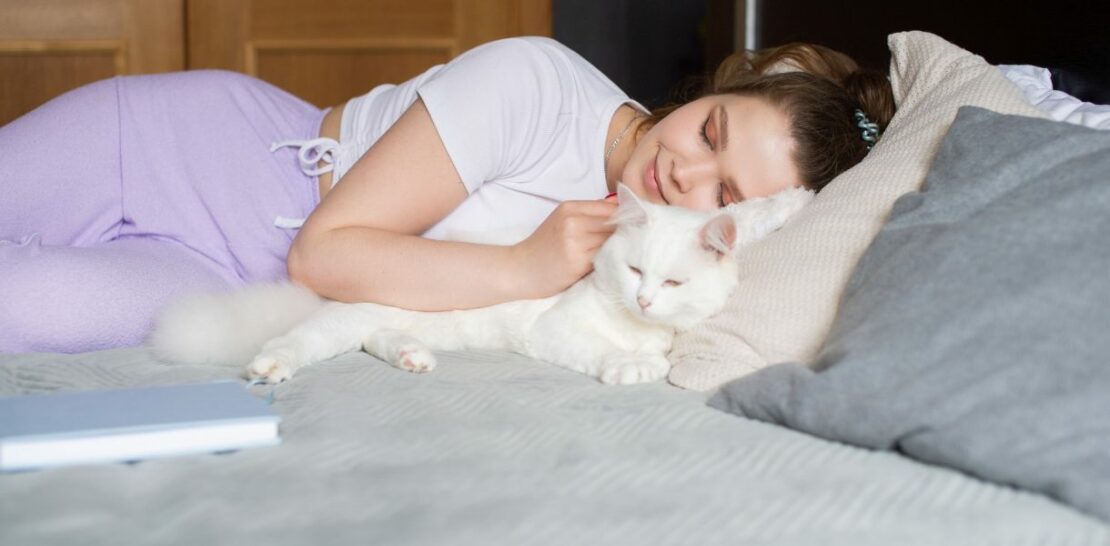For many cat owners, the presence of their feline companions in bed is a nightly ritual, as natural as the rising and setting of the sun.
These nocturnal snuggling sessions often spark curiosity and raise questions about the motives behind this behavior.
Why does your cat feel the need to join you under the covers every night?
Are they seeking warmth, security, or simply companionship?
In this comprehensive exploration of feline bedtime behavior, we will delve deep into the world of cats and uncover the reasons why your whiskered friend is determined to share your sleeping space.
The Science Behind Feline Sleep Patterns
Before we can fully understand why cats choose to sleep with their humans, it is essential to explore the science behind their sleep patterns. Cats, like their wild counterparts, are crepuscular animals, meaning they are most active during the twilight hours of dawn and dusk. As a result, their sleep patterns differ significantly from those of humans, who are diurnal creatures.
- Cats sleep an average of 12 to 16 hours per day: As natural predators, cats require a significant amount of energy to stalk, pounce, and capture their prey. Sleeping for extended periods allows them to conserve energy and recharge for their next hunting session.
- Cats experience both REM and non-REM sleep: Just like humans, cats go through various stages of sleep, including the rapid eye movement (REM) stage, during which dreaming occurs. During REM sleep, cats may display twitching or other small movements, which are perfectly normal.
- Feline sleep patterns change with age: As cats grow older, they tend to sleep more. Kittens and senior cats, in particular, require more sleep than their adult counterparts.
Understanding these fundamental aspects of feline sleep patterns provides a solid foundation for grasping the reasons behind their choice to share our beds.
The Multifaceted Reasons Cats Seek Human Slumber Companionship
While cats are known for their independence and often enigmatic behavior, they are also highly social animals, forming strong bonds with their human family members. This bond extends to their choice of sleeping location, and there are several interconnected reasons why your cat may prefer to curl up beside you at night.
- Safety and security: Cats are instinctively drawn to safe and secure spaces when they sleep, as they are at their most vulnerable during rest. Snuggling up alongside their trusted human companion provides them with a sense of security and protection from potential dangers.
- Warmth and comfort: Cats are naturally drawn to warm spots, and your body heat provides an ideal source of warmth for them during the night. The softness of your bed and the coziness of your covers also make for an appealing sleeping environment.
- Affection and social bonding: Cats form strong attachments to their human family members, and sleeping with you is a way for them to strengthen that bond. By sharing your sleeping space, your cat is expressing their trust and affection for you.
- Establishing territory: Cats are territorial animals, and sleeping in your bed may be a way for them to claim their space within your home. By sharing your sleeping area, they are also marking you as part of their territory through the exchange of scent.
The combination of these factors creates a powerful draw for your cat to join you in bed each night, a behavior rooted in both their evolutionary instincts and their emotional connection to you.
Delving Deeper: Expert Insights into Feline Bed-Sharing Behavior
While the reasons listed above provide a general understanding of why cats may choose to sleep with their humans, it is also important to consider the individual personalities and histories of our feline friends. In this section, we explore expert opinions and research on the topic to further illuminate the complex nature of cat-human bed-sharing behavior.
1. Dr. John Bradshaw, author of “Cat Sense”
Dr. Bradshaw, a renowned cat behavior expert, suggests that cats sleep with their owners as a form of social bonding, which is an important aspect of feline social life. According to Dr. Bradshaw, cats that are well-socialized with humans are more likely to view their owners as fellow cats rather than as a separate species. As a result, they may choose to sleep with their human companions to reinforcethis social connection and maintain their position within the group.
2. Dr. Karen Becker, holistic veterinarian and author
Dr. Becker emphasizes the importance of warmth and comfort in feline sleeping habits, noting that cats have a higher body temperature than humans and therefore seek out warmth when they sleep. Additionally, she points out that cats are creatures of habit, and once they find a sleeping spot that meets their needs for warmth and security, they are likely to return to it night after night. By sleeping with you, your cat has found a comfortable and reliable source of warmth that they can count on.
3. Dr. Mikel Delgado, certified applied animal behaviorist
Dr. Delgado highlights the role of individual cat personalities in determining their sleeping preferences. For some cats, sleeping with their humans may be a way to seek out attention and affection, while for others, it may be a matter of feeling secure and protected. She also notes that cats with a history of trauma or separation anxiety may be more likely to sleep with their owners as a coping mechanism. It is essential to consider your cat’s unique personality traits and experiences when attempting to understand their bed-sharing behavior.
Encouraging Positive Sleep Habits and Creating a Welcoming Sleep Environment for Your Cat
Now that we have a deeper understanding of the various factors that drive your cat to sleep with you, it’s essential to consider how to create a positive and healthy sleep environment for both you and your feline companion. Here are some tips for ensuring that your shared bedtime experience is beneficial to both parties:
- Establish a consistent bedtime routine: Just as humans benefit from routines, cats also thrive on consistency. Creating a predictable bedtime routine, such as providing a small evening meal or engaging in a brief play session before bed, can help signal to your cat that it is time to wind down and prepare for sleep.
- Provide a designated sleep space for your cat: Offering your cat their own designated sleeping area, such as a cozy cat bed or blanket, can help them feel more secure and comfortable when it’s time to sleep. This space should be located close to your bed, allowing your cat to maintain their sense of security and closeness to you.
- Ensure proper hygiene and cleanliness: Regularly grooming your cat, washing your bedding, and maintaining a clean sleep environment are crucial for both your health and your cat’s. Fleas, allergens, and other irritants can disrupt your sleep and lead to health issues for both you and your feline companion.
- Practice gentle reinforcement and boundary setting: If your cat’s bedtime behavior becomes disruptive or problematic, it’s essential to address the issue with patience and understanding. Gently redirecting your cat to their designated sleeping area or using verbal cues to discourage unwanted behavior can help reinforce healthy sleep habits over time.
By implementing these strategies, you can create a harmonious sleep environment that meets the needs of both you and your cat, nurturing your bond and promoting a healthy and restful bedtime routine.
In conclusion, the reasons behind your cat’s desire to sleep with you are multifaceted and deeply rooted in their evolutionary instincts, individual personality traits, and emotional connection to you. By understanding the science behind feline sleep patterns, the role of social bonding, and the importance of warmth and security, you can better appreciate your cat’s bedtime behavior and work to create a positive sleep environment for you both. As you snuggle up with your feline friend each night, remember that their presence in your bed is a testament to the strong bond you share and a reflection of the trust and affection they hold for you.




